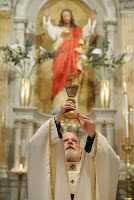 What a wonderful time of year and feast to celebrate. There is something awesome about the baptismal integrity as it provides a footing for our Church. We are baptized into the Paschal Mystery and the prophetic witness of the Apostles. Our Pastoral Council commented my zeal for sprinkling the people. But lots of symbol draws us hopefully to lots of understanding and reflection.
What a wonderful time of year and feast to celebrate. There is something awesome about the baptismal integrity as it provides a footing for our Church. We are baptized into the Paschal Mystery and the prophetic witness of the Apostles. Our Pastoral Council commented my zeal for sprinkling the people. But lots of symbol draws us hopefully to lots of understanding and reflection.The Easter readings these last few days outline an Easter faith to be lived by the Disciples of Jesus. Christian life is not easy. There are outside factions that accuse and abuse those who seek to remain faithful to the new life in Christ. There can also be brokenness within the community which can cause sin, hurt, and division. But our Easter life, when lived in communion with Christ and one another, can be a source of joy and peace. Perhaps this is why our early Church fathers and mothers so often encouraged us to love one another as God has loved us in Jesus Christ.
As Christians living in the world today it is easy to become discouraged or disillusioned. The early Church felt similar struggles. St. Peter will remind all faithful men and women that our faith and our hope are set upon the promise of God. God's goodness will enable us to counter the Sin and confusion of the world. We place our trust in the understanding that God shelters us beneath the shadow of his wings.
Our Church too is guided and guarded by the gifts of the Holy Spirit. As a baptized people we go back to the well-spring of new life to find our courage and our strength. Our journey is with the risen Christ and is one of ongoing growth and transformation. By endeavoring in faithful witness we maintain lives that are buoyant in faith and daring in hope. Our trip through the baptismal font brings us to new life and sets us forth to love and serve the Lord.










